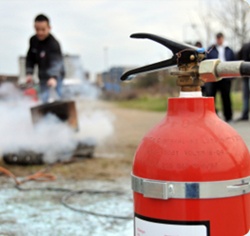 Fire wardens are individuals who are given the task of overseeing fire safety among different places and situations. They are nevertheless required to act responsibly and efficiently during a fire emergency. Here are some of the known principal duties of a fire warden:
Fire wardens are individuals who are given the task of overseeing fire safety among different places and situations. They are nevertheless required to act responsibly and efficiently during a fire emergency. Here are some of the known principal duties of a fire warden:· Takes appropriate, fast, and efficient action once a fire is detected.
· Fights fire if safe to do so.
· Identifies fire hazards at home, workplace, parks, or other places commonly frequented by people.
· Makes sure that escape routes are easily accessible.
· Ensures an alarm is raised when a fire is seen and updates and verifies the alarm level.
· Helps in evacuating people from areas of risk to a safer place.
· Helps assist disabled people.
· Records and reports their observations and findings.
Aspiring fire wardens are required to undergo a formal course or a training to achieve certification to be able to eligibly work as a designated fire warden. There are many institutions today that offer health and safety training and fire warden training courses. You can learn more about these programs at www.ihasco.co.uk.
Anyone who wants to be knowledgeable in fire safety and handling fire extinguishers can actually enroll on the training. You can never really know where or when these types of information and knowledge come in handy.
Fire warden courses and trainings offer general fire precautions and regulations. Here is a summary of what to expect to learn in a fire warden course and training:
1. Understand fire
This includes the study of the fire chemistry, its behavior, capabilities, and weaknesses. These constitute the basic foundation of knowledge of a fire warden to be efficient in firefighting.
2. The common causes of fire and what to do.
Know whether the cause of fire is electrical, spontaneous ignition, incendiarism or arson, static electricity, open flames, liquefied petroleum gas, fireworks, or even as simple as smoking. With these many known and common causes, a different approach should be undertaken with each type.
3. The role of a fire warden.
The duties of a fire warden vary by the working environment. They are usually the ones responsible making sure fire safety laws are met in the workplace.
4. Fire safety regulation and precautions.
These are practiced to prevent and reduce any likelihood of fire that can result in unwanted damages, injuries, and even death.
5. Fire detection and warning.
Early detection is critical in fighting fire and saving lives.
6. The various ways of escaping a fire.
Buildings are strategically designed to have fire exits. However, in tight situations, fire wardens should know other ways to let people escape.
7. Fire drills and evacuation.
These are usually done in every building and school to keep people aware. Fire wardens usually guide fire drills.
You can head on over to www.ihasco.co.uk/training-programme/fire-warden-training for more information on fire warden training.
Posted by finleyatkins
at 4:40 AM EDT
Updated: Thursday, 31 May 2012 3:12 AM EDT
